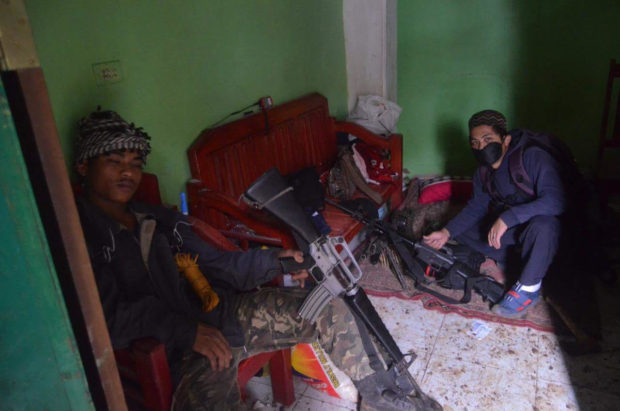AFP: Kids forced to fight with terrorists

A Maute gunman is seen taking a nap while another fighter rests in between fighting in Marawi City in this undated photo taken from a smartphone of a a slain suspected Maute terrorist. The military released photographs of Maute militants in candid moments on July 9, 2017. (Photo released by the Armed Forces of the Philippines)
Children, including those taken as hostages, are being forced to fight alongside Islamic State-inspired terrorists battling government forces for control of Marawi City, the military said on Monday.
The terrorists seized Marawi on May 23 in a bid to establish an enclave for the Middle East-based Islamic State (IS) jihadist group in Southeast Asia, and about 80-100 remained holed up in the city despite intense military efforts to oust them.
Teenagers
Some of the terrorists are teenagers who may have been recruited and trained to use guns when they were still children, Brig. Gen. Restituto Padilla Jr., spokesperson for the Armed Forces of the Philippines, told reporters in Malacañang.
“We continuously get disturbing narratives from [escaped residents] that children as well as hostages are being employed in the firefight,” Padilla said.
He said the military did not know exactly how many children had been taken by the terrorists as hostages.
Casualties among children and adult hostages forced to take up arms could not be ruled out, Padilla said.
“As disturbing as it is, our troops are doing their best to avoid any casualty among these children that are being employed,” he said.
“But in the event that they are armed and they bear arms and are involved in the fighting, there’s nothing much that we can do. Similarly with the hostages being forced [to fight],” he added.
Hostages
Shortly after seizing Marawi, the terrorists from the Maute and Abu Sayyaf groups took at least a dozen hostages, including a Catholic priest.
Some of the estimated 300 other civilians still trapped in the battle zone may have also been taken captive, Padilla said.
The military earlier said civilians had been forced to help the terrorists by carrying supplies and ammunition, bearing their wounded, helping them loot the city and fighting government forces.
Escaped hostages, the military said, reported that the terrorists executed at least six hostages for refusing to take up arms against the security forces.
Asked how the military would engage the child warriors, Padilla said soldiers, while allowed to take defensive action when their lives are at risk, would endeavor to rescue “a child or an individual who is being forced into the fight.”
“During engagements, if there are wounded and [we] see they are children, we help them right away. We are not in a rush to shoot a child who is running even if they are armed. If we could disable them, but we will not kill them,” he said.
More than 500 killed
More than 500 people have been killed in the fighting, including 379 terrorists, 89 soldiers and police, and 39 civilians, according to figures released by the government on Monday.
Most of Marawi’s more than 200,000 residents have fled their homes.
Daily airstrikes and artillery barrages against terrorist snipers who control tall buildings have left the city’s central business district a ghost town.
Padilla expressed hope that the fighting would soon be concluded.
“We continue to gain headway with our operations on the ground,” he said. —With a report from Agence France-Presse